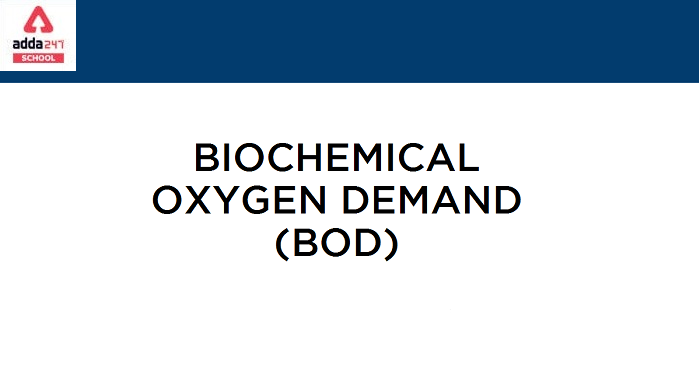BOD Full Form
BOD Full Form: Biochemical Oxygen Demand also known as Biological Oxygen Demand is the BOD full form. The amount of dissolved oxygen consumed by microorganisms in the biological process of metabolising organic materials in water is known as biochemical oxygen demand (BOD). The BOD of a sample is also an indication of the amount of organic matter contained in it. Organic wastewater contamination is quantified in terms of Biochemical Oxygen Demand (BOD). A higher BOD value implies that the water has a low dissolved oxygen concentration and is polluted.
What is the full form of BOD?- How to Calculate BOD?
This relative oxygen requirement is evaluated using established laboratory techniques after 5 days using a redox titration known as the Winkler method. The degree of water quality may be estimated based on the Biochemical Oxygen Demand measured. It is measured in milligrammes of oxygen per litre of sample. It is normally assessed on a scale of 1-9 with a maximum of 100. After 5 days of incubation at 20 degrees centigrade, BOD (Biochemical Oxygen Demand) is computed and represented as milligrammes of oxygen used per litre of sample. The formula for calculating BOD is as follows:
BOD = [ D(i) – D(f) ]/P
Where:
D(i) = Oxygen concentration which is dissolved Initially.
D(f) = Final dissolved oxygen concentration
P = Volumetric fraction of wastewater
BOD Full Form in Biology
Biochemical Oxygen Demand Sources
Natural Sources: Surface runoff, dead animals, floating trash, and soil erosion all contribute to an increase in BOD.
Man-made Sources: Water pollution from paper mills, jute mills, food processing factories, and a high concentration of chemicals like phosphates raises the BOD of water.
BOD Full Form & Level in Natural Waters
Organic substances and dissolved oxygen are present in varying amounts in natural water bodies such as ponds and lakes. Inside these fluids, microorganisms that rely on organic nutrients use dissolved oxygen to break down them, providing energy for growth and reproduction. BOD occurs in favourable circumstances like nutritional concentrations, temperature, and the availability of enzymes. Total Biochemical Oxygen Demand is the quantity of oxygen required to fully break down organic molecules to CO2 and water during the microbial life cycle (Total BOD). When microbiological organisms use dissolved oxygen quicker than atmospheric air dissolves, the oxygen level becomes unbalanced, resulting in the death of fish and aquatic species.
BOD Full Form: BOD Levels
Here we have given the BOD Levels and their meaning. Check the information given in the table below:
| BOD Levels | Water Quality |
| 1 to 2 | Very clean, there isn’t a lot of organic garbage in the water supply. |
| 3 to 5 | Fair, moderately clean. |
| 6 to 9 | The organic stuff is present, and decomposition is taking place. |
| 100 or more than 100 | Very poor, organic waste is present. |
Factors Affecting BOD
Here we have given the factors affecting the BOD level. The factors affecting the BOD level are temperature, pH, types of microorganisms, and organic compounds found in water. Check the details of these factors given below:
Temperature: High temperatures reduce dissolved oxygen in water while increasing metabolic rate.`
pH: An irregular pH value causes a considerable drop in the elimination rate of organic molecules, which has a substantial impact on BOD readings.
Types of microorganisms: Several microorganisms promote the development of aerobic bacteria, which in turn alter BOD.
Organic compounds found in water: The number and kind of organic components that determine the rate of dissolved oxygen consumption, which influences water’s Biochemical Oxygen Demand.
How to Reduce BOD Level
Here we have given the methods to reduce the BOD level. Here we have given the 9 methods that can help to reduce the BOD level.
- Reverse Osmosis
- Upflow Anaerobic Sludge Blanket Reactor (UASBR)
- pH Control of waste stream
- TSS Removal of wastewater
- Ozone Water Treatment
- Advanced Oxidation Processes (AOP)
- Coagulation
- Activated Charcoal Adsorption Method
- ElectroFlocculation
Significance of BOD
Here we have written the significance of BOD. Read all the significance of BOD and know how much BOD is important in day-to-day life.
- Used to calculate the respiration rate of living beings.
- In medical sectors, BOD determines oxygen consumption in cell cultures.
- The decrease in BOD indicates the intensity of effluents discharged by sewage treatment plants.
- It calculates inorganic compounds’ Chemical Oxygen Demand (COD).
- Important in determining water quality.
Methods Used to Measure BOD level
There are many methods to measure BOD levels. Here we have given some methods to measure the BOD level. Check the methods given below:
- Dilution method
- Manometric method
- Biosensor
- Fluorescent
- Polarographic method
- Software sensor
- Real-time BOD monitoring
Related Post:
- Application For Sick Leave For Office & School In English
- TGT Full Form: Trained Graduate Teacher
- What Is Bond Order Of Co Molecule Is?
- What Is The Factorial Of Hundred (100)?
- What Is The Valency Of Nitrogen?
- Fathometer Is Used To Measure Ocean Depth
- Uidai.Gov.In My Aadhar- New Registration, Update, Download
Full-Form of BOD- FAQs
Q.1 What is the full form of BOD?
The full form of BOD is Biochemical Oxygen Demand. It is defined as the quantity of dissolved oxygen required by microorganisms for the aerobic decomposition of organic matter present in water bodies (or a certain water sample) at a given temperature during a given time period.
Q.2 How to check the BOD level of water?
Water BOD is calculated in two stages. To begin, collect two samples of water and analyse one immediately while incubating the other in the dark at 20 degrees Celsius for 5 days. After 5 days, test the incubated sample. The quantity of BOD is the difference in oxygen levels between two samples in milligrammes per litre.
Q.3 What are the methods to reduce the BOD level?
The methods to reduce BOD levels are Reverse Osmosis, Upflow Anaerobic Sludge Blanket Reactor (UASBR), pH Control of waste stream, TSS Removal of wastewater, Ozone Water, Treatment, Advanced Oxidation Processes (AOP), Coagulation, Activated Charcoal Adsorption Method, Electro Flocculation









 CBSE Admit Card 2026 for Private & R...
CBSE Admit Card 2026 for Private & R...
 AILET 2026 AIR 1: Check Full Toppers Lis...
AILET 2026 AIR 1: Check Full Toppers Lis...
 AILET Result 2026 OUT, How to Download S...
AILET Result 2026 OUT, How to Download S...














